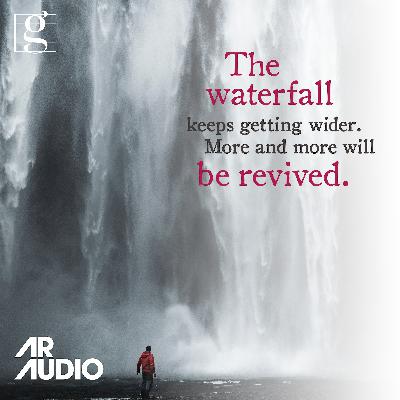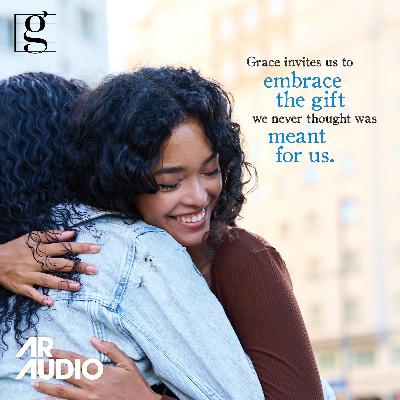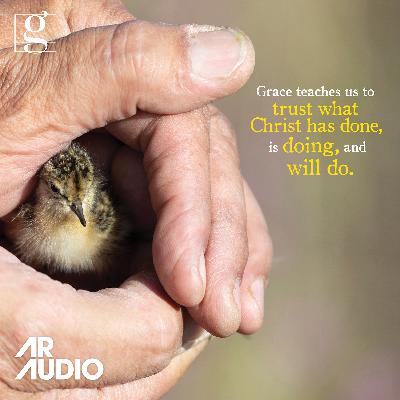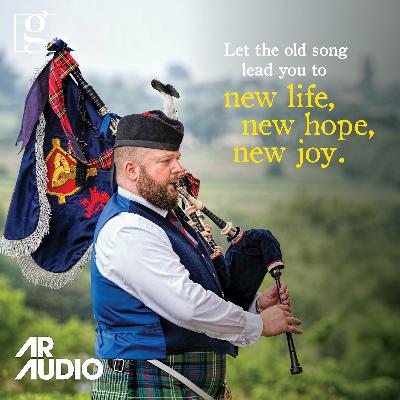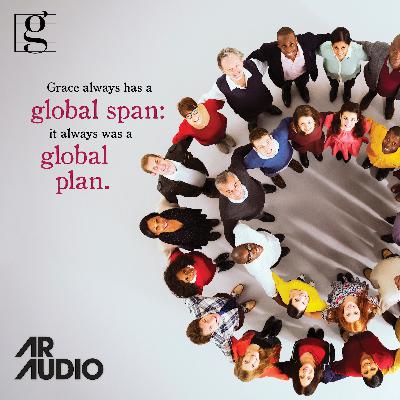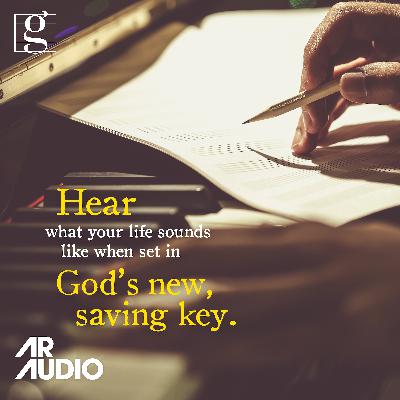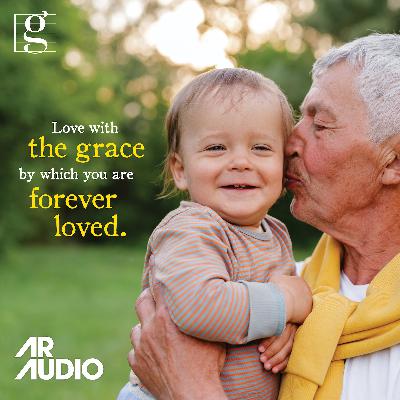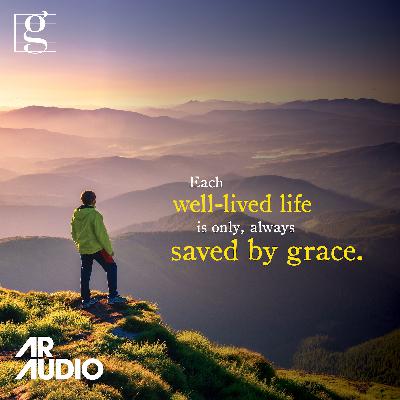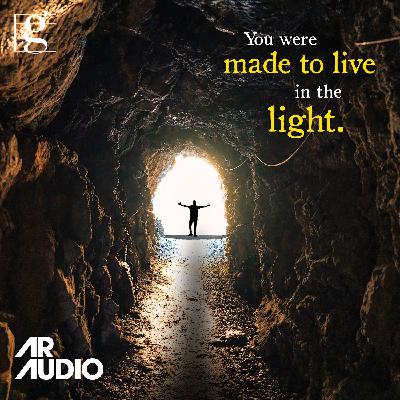Discover Adventist Review Podcasts
Adventist Review Podcasts

486 Episodes
Reverse
Below our deepest hurt and darkest shame, there is the grace of God—forgiving us, rebuilding us, repairing all that’s broken.
Above our highest joy and most euphoric moments, there is the sheer delight of God—applauding us, encouraging, enlarging celebration.
Through every stage of every journey—in trust, in fear; in faith, in doubt; in youth, in gray maturity—we’re never left alone or told to make it on our own. Despite appearances, the road is never empty.
Around us each are Jesus’ everlasting arms—sustaining us, protecting us, embracing us. His hands are ever on us.
“For from Him and through Him and to Him are all things” (Rom 11:36).
“Who will separate us from the love of Christ? Will hardship, or distress, or persecution, or famine, or nakedness, or peril, or sword? . . . No, in all these things we are more than conquerors through Him who loved us” (Rom 8:39).
We are befriended by the One who rules all time and space.
Receive the gift. And stay in grace. -Bill Knott
One hundred years ago, the world knew all about ticker-tape parades.
Returning war heroes, major politicians, and sometimes even aviators and athletes would be honored by a slow-motion ride in an open-topped limousine through the canyons of New York City’s financial district, showered by literally millions of paper fragments from stock ticker machines. It was the ultimate symbol of popular success.
No wonder so many dreamed of that day when they would ride in the convertible, waving slowly to the thousands lining the way.
But when it comes to how our lives find meaning and renewal, we aren’t the hero in this parade. Though our egos, our music, and so much of our “faith talk” put us in the spotlight, reveling in the shower of ticker-tape, this celebration isn’t about us. This parade is for Jesus, “the champion who initiates and perfects our faith. Because of the joy awaiting Him, He endured the cross, disregarding its shame. Now He is seated in the place of honor beside God’s throne” (Heb 12:2).
Grace isn’t just about making us feel special, celebrated or affirmed: those are fortunate results, not purposes. Grace truly understood is the grateful cheer going up from millions of rescued hearts to the One who made it happen through His sacrifice and love.
There’s just one hero in this story. And it’s not me—or you.
Now stay in grace. -Bill Knott
We celebrate achievement in every arena of our daily lives, and rightly so.
Parents rejoiced when we first slept through the night; the first time we rolled over in the crib; when we finally tolerated the puréed squash; when we took our first tottering steps.
We were congratulated for learning our numbers; mastering the alphabet; riding a bicycle; reading a sentence. People cheered when we scored the soccer goal; sank the jump shot; hit the home run.
Accolades flowed if we exceeded our peers in history, algebra, languages, or physics.
Employers nodded appreciatively at résumés crammed with academic and professional excellence.
That’s why we find ourselves so unprepared for the unexpected gift of grace,
for which we didn’t work, and which we never earned.
t takes us days, months—often years—to quiet our over-trained and striving souls long enough to receive what God says only He can provide.
“God saved you by His grace when you believed. And you can’t take credit for this; it is a gift from God. Salvation is not a reward for the good things we have done, so none of us can boast about it. For we are God’s masterpiece” (Eph 2:8-19).
Grace is the story of what Jesus has achieved for us. Accept His gift, and He will take you further than you’ve ever dreamed.
So stay in grace. -Bill Knott
A famous journalist once wrote, “The true secret of editing is to know what to place in the wastebasket.”
That’s good counsel for those who seek to live in grace during 2026 as well. The secret of successful living is knowing what to throw away, what to forget, what to discard. In the desk of life from 2025 there are likely many things you’d do better to be without.
Throw away the slights and the insults you received in the old year. Hanging on to them this long has already caused you to be something less than the kind and gracious person you’ve wanted to be.
Throw away the grudges you’ve nourished during the last 12 months. Though they’ve probably provided you with many moments of bitter satisfaction, they haven’t deepened your faith or your kindness even a little.
In 2026, collect coins if you wish; collect stamps; collect postcards; collect tropical fish. But don’t collect grudges. They are part of what lies behind that ought to be forgotten.
And finally, throw away your sins when you’ve repented of them, for Jesus promises to do the same: “I will be merciful toward their iniquities, and I will remember their sins no more” (Heb 8:12). “As far as the east is from the west, so far He removes our transgressions from us” (Psa 103:12).
Grace lets us lean into the future with joy and expectation.
So stay in it. -Bill Knott
So here’s the greatest cause for Christmas joy—not that you deck your house with hundreds of lights or fill your home with dozens of gifts—but that the Lord of heaven and earth entered into the commonness of our lives to be our Saviour from sin and self-absorption.
He’s the reason why at every Christmas a song rises from millions of redeemed men and women to mingle with the anthem of those long-ago angels—a hymn of gratitude and grace.
We discover that life can be something better than a mean little existence between the cradle and the grave. We learn that our day-to-day experience can be full of joy and possibilities, of hope and healing. The glow that began in the midnight fields near Bethlehem has become a radiance none can extinguish: “In Him was life, and the life was the light of all people” (John 1:4).
The gift given us in Jesus is why we search each Christmas for the words of that angel hymn: “Glory to God in the highest and on earth peace, good will toward all.”
Gratitude is just another way of saying “Thanks” for grace.
So stay in grace. -Bill Knott
Had He arrived with fanfare from some royal balcony, with heralds officiously announcing His nativity to thousands massed to hear the news, He might have changed the politics of one small corner of the world for 40, even 50, years.
Had He been born in some rich villa spilling down the hillside to the sparkling Aegean, we might find passing mention of His name in annals of the empire.
Had He been birthed and raised among the scholars and the gifted, all that He said and all He taught might yield a footnote in the history of earth’s wisdom.
But heaven was both gracious and strategic. When God gave us His unique and irreplaceable Son, He gave Him to the ones without the power, wealth, or learning. From that first night, the hiddenness of grace that brought Him to the poor, the common, the forgotten has made the story of His birth the fulcrum of all history. He is the truly unforgettable Man.
This Child born to us is fully ours, however we are ranked by those who seem to rule the world. In Jesus, grace became embodied, changing lives, forgiving sins, renewing hope for all who trust the gift He is.
Be strong in grace; be rich in grace; be wise in grace this Christmas.
And stay in it. -Bill Knott
The story that brings joy and hope to billions every Christmas brings dread to those corrupted by power.
The old prophecy—fulfilled in the birth of Jesus—that “unto us a Child is born, unto us a Son is given; and the government will be upon His shoulder” (Isa 9:6)—that prophecy rattles every regime built on force, and shakes the citadels of coercion. All the armies they sent and all the dynasties they built will ultimately surrender to a Child with no earthly authority, an infant born in a shed for animals: “Every tongue shall confess that Jesus Christ is the Lord, to the glory of God the Father” (Phil 2:11).
His authority rests on compassion and restoration—the truth that we can be reconciled to God and to each other. The power of attractive love brings Him the loyalty of so many abused by force and greed. “The Word became flesh and lived among us, and we have seen His glory, the glory as of a Father’s only Son, full of grace and truth” (John 1:14).
Christmas is a powerful reminder that love will ultimately triumph. The grace we witness in Jesus’ birth is the grace with which He will reign forever.
So stay in grace. -Bill Knott
Come stand with me beneath the waterfall of grace.
There is no waiting line, no jostling for position. There are no elbows, scornful faces, or murmured whispers of contempt. No one here will keep you from receiving what your withered spirit needs.
This is the fellowship of the redeemed. This is the company of those who gladly—daily—open their parched lives to the “washing of rebirth and renewal by the Holy Spirit” (Titus 3:5).
Grace isn’t some scarce resource, guarded by the worthy, requiring conservation or close rationing as though it might run out. This is the river of life—re-life; renewal; resurrection—flowing from the grace of Him whose great forgiving is “a spring of water gushing up to eternal life” (John 4:4).
Those who really “get” the grace of God keep pulling all those they love into the healing, rehydrating stream. The waterfall keeps getting wider. More and more will be revived.
Step out of dry and into drenched.
And stay in grace. -Bill Knott
The moments that most change our lives aren’t just the big ones when we say “I do,” or land the great new job, or stand on some breathtaking peak to stare at wondrous landscapes. Quiet moments also have within them the stuff of destiny.
That moment—sometimes in a crowd; more often alone—when we trust ourselves to grace—haltingly, even tentatively—becomes the pivot of our everafter.
Our looming fear reminds us always of our brokenness and sin: the record of our foolishness tempts us to believe that only righteous deeds can ever change what we think is the Father’s frown. In reality, “God sent His Son into the world not to judge the world, but to save the world through Him” (John 3:17). The Bible tells us we are deeply and unchangeably loved “while we were yet sinners” (Rom 5:7)—before we knew to tidy up our act, behave accordingly, or polish our veneers.
Jesus is the Father’s standing—kneeling, dying, rising—invitation to trust the love that will not let us go. Grace invites us to embrace the gift we never thought was meant for us, to revel in the long, essential kindness we will never deserve but may always enjoy.
So stay in grace. -Bill Knott
Is there a greater joy than knowing for even one hour that you are in the center of God’s will—that through some miracle of grace, you are aligned with plans the Father made to win you back and win the hearts of those you love?
Is there a better confidence than the one which every Sabbath reminds you that “the earth is the Lord's, and the fullness thereof; the world, and they that dwell therein”?
Can there be a deeper security than when Christ’s word of certainty penetrates your fears and doubts with the assurance, “He is before all things, and in Him all things hold together”?
The answers to those questions, friends, are “no,” “no,” and “no”—nothing "will be able to separate us from the love of God in Christ Jesus our Lord.”
Your hope will rise; your joy will find its wings. Trust is the dawn from which our daylight grows.
So stay in grace. -Bill Knott
We worry for the best of reasons, or so we tell ourselves.
An unexpected bill arrives. The car won’t start. A three-year old grows feverish. Layoff slips are piling up for even long-time workers.
The brooding circle of our fears goes rounding for an answer. In all those moments “in between,” we just can’t break their vast, erosive power. We want control—ours or anyone’s—to hold at bay dark outcomes that we dread.
And God’s Word doesn’t chide us when we worry in our helplessness, nor urge us to “Ac-Cent-Tchu-Ate the Positive.” We’re given there a clear-eyed glimpse of what is really true about our lives—of God’s deep, constant love for us, for now and for forever: “Don’t be afraid, for I am with you. Don’t be discouraged, for I am your God. I will strengthen you and help you. I will hold you up with My victorious right hand” (Isa 41:10).
When we align our fraying hope with heaven’s lasting kindness, we give ourselves to what is truer than our worries: “Now may our Lord Jesus Christ Himself and God our Father, who loved us and by His grace gave us eternal comfort and a wonderful hope, comfort you and strengthen you in every good thing you do and say” (2 Thes 2:16-17).
Grace teaches us to trust what Christ has done, is doing, and will do.
Let fear recede and slip away.
Then stay in grace. -Bill Knott
Here’s a good word for all those self-help strategies.
The websites and the bookstores are crowded with a million crafted plans for how to lose unwanted weight, get control of personal finances, or marry the person of our dreams. Millions of pounds of body fat have been shed; ten million family budgets have been strengthened and secured—and at least a handful of romances have been kindled by wise tips on what makes us more attractive.
These titles tap a human ache for personal improvement, for better health, for successful relationships. We each have somewhere deep within potential to make better choices—and find better outcomes.
But self-help strategies can’t address the even more persistent ache for redemption and recovery. We’re powerless to change the facts: “All have sinned and fall short of the glory of God” (Rom 3:23), the Bible tells us. “No one is righteous—not even one” (Rom 3:10).
So heaven has a strategy that changes both our here and our hereafter: “For God was in Christ, reconciling the world to Himself, no longer counting people’s sins against them” (2 Cor 5:19).
When we couldn’t do a thing to change our lostness and our brokenness, the deep, unending grace of God offered us eternal life for all who trust in Jesus.
Self-help has its place: that place is not your forever destiny.
Only grace will do.
So stay in it. -Bill Knott
You’ve heard the song a thousand times, but have you lived the words?
For more than 250 years, believers have cherished the clear simplicity of “Amazing Grace.” Celebrated recordings 50 years ago by bagpipe bands and pop artists catapulted the old song to international prominence as a kind of “hymn for the world.” Millions resonate with the ache it expresses for freedom, redemption and a future.
But buried in its timeless lines is a simple summary of an equally timeless Bible truth: “God sent His Son into the world not to judge the world, but to save the world through Him” (John 3:17).
John Newton’s memorable lines capture our natural wretchedness, our lostness, our inability to truly understand our plight, and our resulting fear. Filled with light only the gospel can bring, his verses also celebrate recovery, relief, clear vision, and being found by the seeking love of the Father.
The author of “Amazing Grace” knew what millions who blithely sing his hymn have never fully grasped: the grace that saves us doesn’t override our choice as moral beings. We must agree to let the redemption achieved by Jesus stand in place of all we’ve done. “If you confess with your mouth that Jesus is Lord and believe in your heart that God raised Him from the dead, you will be saved” (Rom 10:9).
So let the old song lead you to new life, new hope, new joy. Embrace the grace that Jesus always offers.
And stay in it. -Bill Knott
It’s natural to think of the story of our lives as a gradually rising line of progress.
We were once toddlers: now we stride—and even race—through professions and relationships. Our minds have grown acute: we’ve mastered subtlety and sarcasm, posturing and self-promotion. We’ve learned the fine art of “faking it until we make it.”
But the growling in the basement grows insistent. We sense—and if we read God’s Word, we know—that He’s not deceived by the polished spiritual résumé that a dozen self-help books have taught us to prepare. “All have sinned and fall short of the glory of God,” (Rom 3:23) the Bible says.
Our finest spiritual achievements are illusions we’ve chosen to believe, because “the heart is deceitful above all things and beyond cure. Who can understand it?” (Jer 17:9). Candor—full, undistracted clarity about our lives—reveals the widening gap between our best efforts and God’s expectations.
Enter a Saviour—“fully human in every way,” (Heb 2:17) but without sin. “God made Him who had no sin to be sin for us, so that in Him we might become the righteousness of God” (2 Cor 5:21). He carries both the weight and the memory of our brokenness so far away that we can finally discover the joyful life we’ve always wanted.
Grace promises welcome relief for all who trust in Jesus. There’s healing redemption in no other.
So stay in grace. -Bill Knott
Ah, the joys of a clear conscience.
Entering a room of jostling colleagues, sure you’ve spoken kindly of each one. Finishing your tax return with certainty you’ve paid each charge the law required. Walking by mouth-watering chocolates for six days straight without even opening the box.
This doesn’t sound like your story? You either?
The inner voice that calls to mind our secret crossings of the line is rarely ever silent. While waiting for much-needed sleep, we churn on memories we’d love to lose. We’ve whittled down our rivals; we gave ourselves deductions for “unspecified” expenses; we bought replacement boxes of those chocolate cremes we can’t resist. The list our consciences won’t leave alone is long—and growing longer.
Which makes grace even lovelier when we discover its power and its healing.
When God forgives us through the sacrifice of Jesus, He chooses—in His grace—to forget the very things we otherwise could not forget. “As far as the east is from the west, so far does He remove our transgressions from us” (Psalm 103:12).
The final word about our lives is not a litany of pride or gluttony or lust. The word is love—the kind that will not let us go.
In grace, we may forget the things God chooses to forget.
So stay in it. -Bill Knott
It’s natural enough to prize what benefits me most.
Self-interest is the driving force in almost all our culture. Do I like it? Does it taste good? Did it make me laugh? Does it put money in my pocket? We measure almost everything by what we get and gain.
And so it’s natural to think of something as extravagant as God’s unprecedented kindness as a kind of fortunate transaction that wipes away our past and entitles us to heaven.
But God’s deep kindness in sending Jesus as the bearer of our sins was never only meant to “save a wretch like me.” Yes, grace redeems us first as individuals, but never leaves us spiraling in spiritual self-interest.
The purpose of the love of God is that we freely give what we’ve received. “God’s love has been poured into our hearts through the Holy Spirit that has been given to us” (Rom 5:5). The stream of grace should always have an outlet, flowing from God’s heart through yours to water other barren soil. What you receive, you’re meant to share.
Grace always has a global span: it always was a global plan. “For this is how God loved the world: He gave His one and only Son, so that everyone who believes in Him will not perish but have eternal life” (John 3:16).
The love that saves us makes us gracious, loving as we have been loved.
So stay in it. -Bill Knott
Have you ever listened to a dull and tired song—only to be stirred and thrilled when it reprised in some new, higher key?
Then you know something of the grace of God, whatever else your story tells.
Grace comes to us as unexpected joy when our performance, short or long—had lifted neither us nor anyone around us. We were muddling through the music, vocalizing rote notes and mangling the lyrics. We didn’t know a brighter, higher anthem lay hidden in the lines.
But God in kindness teaches us to sing of faith so rich and love so sweet we are amazed we never knew it sooner. With one much-humbled, transformed saint named Paul, we happily exclaim, “Although I am the very least of all the saints, this grace was given to me to bring to the gentiles the news of the boundless riches of Christ and to make everyone see what is the plan of the mystery hidden for ages in God, who created all things” (Eph 3:8-9).
Grace pulls us up—our bodies, minds, and especially our hopes—when we’ve been mumbling through the stanzas of our yesteryears. The God who lives and gives—and gives again—surprises us with freedom from our past and freedom for our future.
Hear what your life sounds like when set in God’s new, saving key.
And stay in grace. -Bill Knott
When most of what we read and see is governed by some soulless algorithm built to anger us or sell us something—it’s hard to know if joy is real, if love is kind, if gentle words are really meant to bless.
And yet joy lingers, gentleness persists, and tens of millions of times a day, someone whispers “I love you” to a child, a spouse, a friend, a former enemy.
This is true for both those who do not own the name of Jesus and for those who celebrate His power and love: “God’s love has been poured out into our hearts through the Holy Spirit, who has been given to us” (Rom 5:5).
The tenderness we witness, the patient words we find when stressed, the arms with which we wrap the hurting and the sinful—these are the remnants of the love once given at Creation and now given us preeminently in Jesus: “This grace was given us in Christ Jesus before the beginning of time, but it has now been revealed through the appearing of our Savior, Christ Jesus, who has destroyed death and has brought life and immortality to light through the gospel” (2 Tim 1:9-10).
Resist the anger amped by code. Love with the grace by which you are forever loved.
And stay in it. -Bill Knott
“He’s so much better than I am,” we say, proving just how little we know of someone else’s life.
“She’s a saint,” we say admiringly, assuming that the woman we can see is always just as good as we imagine.
We assign a top-notch grade to behaviors we observe, and make assumptions that the life consistency we can’t achieve is somehow available to others.
But grace reminds us of the brokenness we share—each one of us—regardless of the estimate of others.
Behind the fair façade of piety and cool, we each know just how far we fall below the expectations of our God—and how each well-lived life is only, always, saved by grace.
All ranks, all grades, all estimates are vanities and not realities. If you can find a soul not absolutely saved by grace, then you have found the rarest form of human life.
Give up your search: there is no other way.
And stay in grace. -Bill Knott
Going underground is one of humanity’s oldest responses to fear, war, or pestilence.
Archaeologists have uncovered vast subterranean cities, carved out by those who believed that living in the light made them vulnerable. Victims of persecution, fugitives—even families fleeing natural disasters or climate shifts—all chose to dwell where only torches and flickering lamps could pierce the darkness.
But human beings weren’t made for life underground. Our bodies, our minds, and even our food sources depend on what’s green and growing and bathed in sunlight. Only fear—without and within—could cause us to live where we otherwise bury our dead.
And the darkness is never only physical. Living without sunlight distorts our grasp of reality, and even of God. If we never see the sun or the stars of the Milky Way, we think He is no bigger than what scares us.
Yet there is light for us—warm, welcoming, life-giving. God’s Word declares the good news of our liberation: “He has rescued us from the kingdom of darkness and transferred us into the Kingdom of His dear Son, who purchased our freedom and forgave our sins” (Colossians 1:13–14).
You were made to live in the light. Be done with all that’s buried, fearful, and dark.
And stay in grace. -Bill Knott









